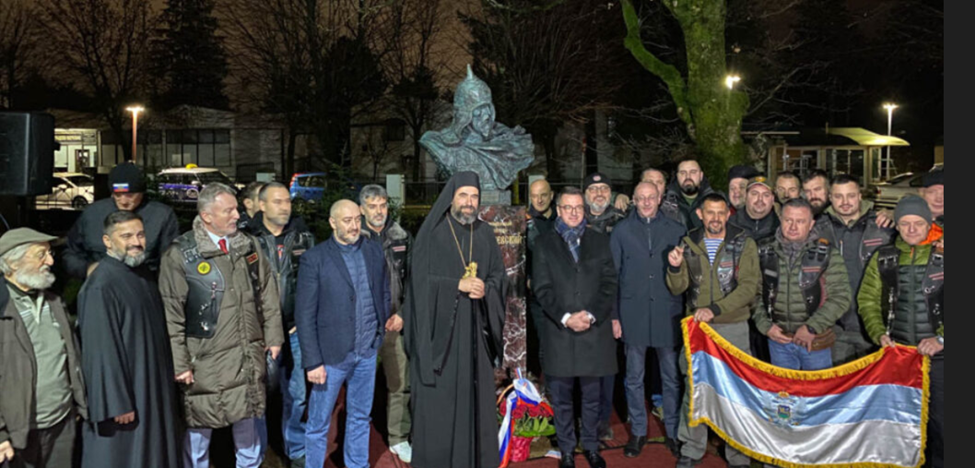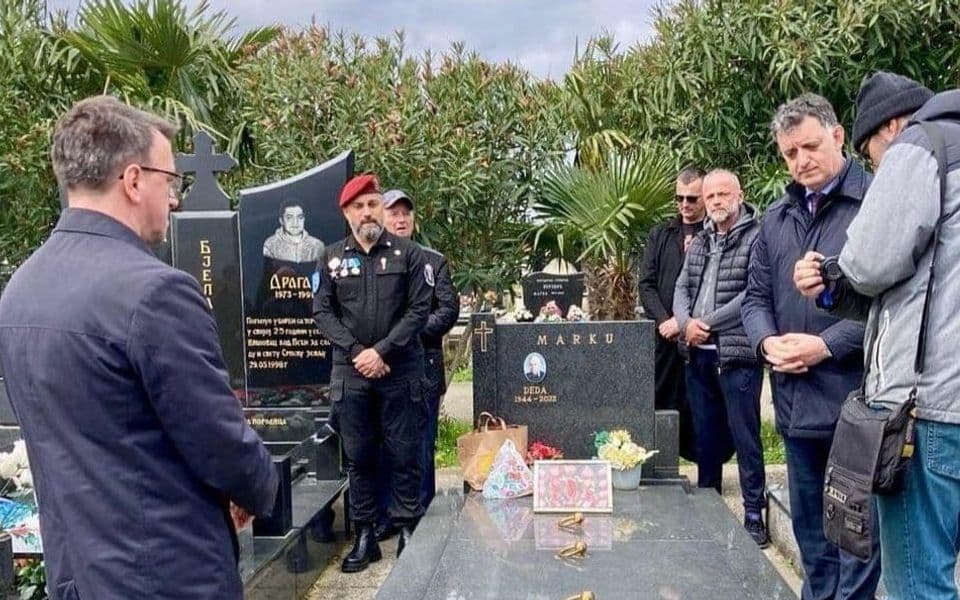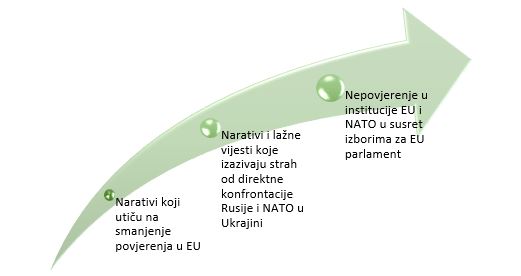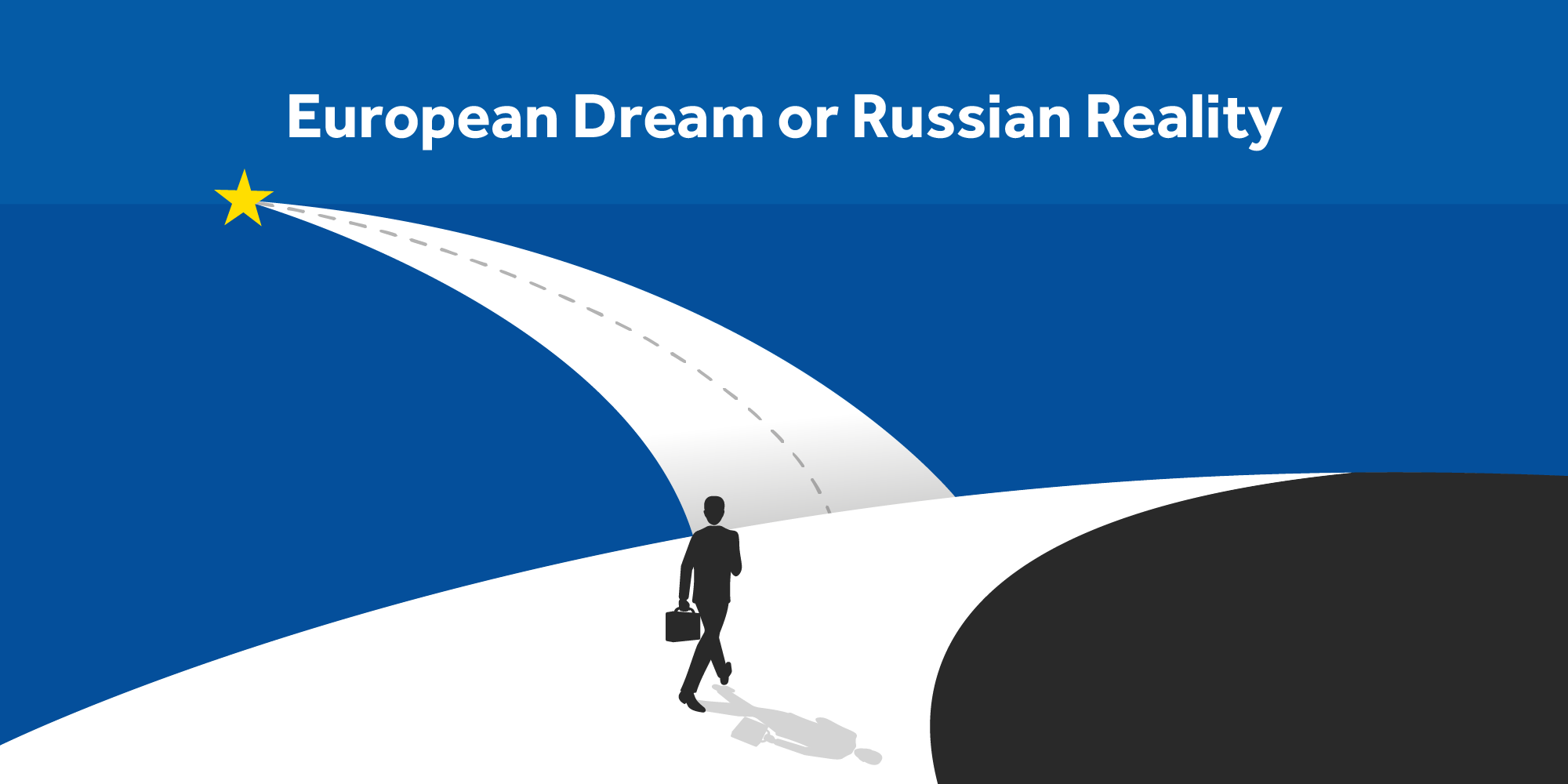Although Russian diplomatic activities have been almost nonexistent in the European Union (EU) countries since the beginning of the war in Ukraine, the entry of political parties acting as pro-Russian proxies into the ruling coalition in Montenegro has opened a new space and increased presence in public life for the Ambassador of the Russian Federation in Podgorica.
Despite Montenegro aligning its foreign policy on this matter with the EU’s foreign policy, Ambassador Maslennikov is a regular guest at events organized by pro-Russian proxy actors, which coincide with Russian hybrid activities in the EU territory, as he confirmed in an interview:
And now, instead of attending government offices and diplomatic receptions in Podgorica, we are present at events in numerous municipalities in the country, which is better. This way, we learn firsthand how Montenegro lives and breathes.
Undermining Euro-Atlantic orientation at the local level
Russia’s strategy in undermining Montenegro’s European agenda consists of activities at the local level organized by pro-Russian proxies, which are in line with the official anti-EU narratives of the Kremlin. Historical revisionism plays a significant role in Russian hybrid activities in the Western Balkans, especially through the abuse of religion and religious elements. The predominant activities of the Russian ambassador occur in coordination with militant Orthodox brotherhoods in Montenegro, using emotional manipulation to spread pro-Russian narratives.
One of the narratives to which Ambassador Maslennikov has devoted significant space is that of strengthening the so-called traditional ties between Montenegro and Russia, which was particularly evident during the unveiling of the bust of Alexander Nevsky in Andrijevica and Nikšić on December 6, 2023. The event was attended by mayors of the municipalities of Nikšić, Andrijevica, and Berane: Marko Kovačević, Željko Ćulafić, and Vuko Todorović. The Russian House in Belgrade, the Russian Embassy in Montenegro, and the Serbian Orthodox Church thus exploit, for psychological-propagandistic purposes, the myth that Vasojevići prayed to Alexander Nevsky in the 18th century before a decisive battle against the Turks.

Russian propaganda and hybrid engineering of historical events culminated during the commemoration of the 25th anniversary of the NATO intervention in the FRY. Russian propaganda uses this event to spread emotional and manipulative narratives, but also as a moment to activate the entire echelon of pro-Russian proxies in the Western Balkans.
Ambassador Maslennikov’s hybrid activities, which undermine Montenegro’s strategic orientation, were evident during the commemoration of the anniversary of the NATO intervention on March 25, 2024, in Tivat. Maslennikov, together with the President of the Municipal Assembly of Tivat, Željko Komnenović, and members of the Orthodox Brotherhood Miholjski zbor, attended a commemoration for a fallen member of the 63rd Parachute Brigade during the NATO intervention in 1999.
His statement from that event, that the US and NATO, through missile and bombing attacks, demonstrated to the world what humanitarian intervention and American democracy are, illustrates Moscow’s multi-channel propaganda strategy, manipulating historical facts to provoke anti-Western sentiment. Furthermore, in a statement for Borba, he perceives that event as crucial for the decline in the support for NATO in Montenegro, disseminating the unfounded narrative that confrontation with the FRY and Russia serves as an excuse for the Alliance’s survival.
In Budva, at the Academy of Knowledge founded by the Municipality of Budva, on April 7, 2024, a propaganda film titled Tsar Nikolai Between Montenegro, Serbia, and Donbas by Igor Damjanović was shown. The propaganda film by the pro-Russian war correspondent of the IN4S portal depicts how the cult of the Russian Tsar Nicholas is respected in Montenegro, Serbia, and the Donbas. The Russian Ambassador used that opportunity as well to emphasize the importance of nurturing tradition and international relations. The element of tradition and traditional values plays an important role in pro-Kremlin propaganda in the Western Balkans. The narrative of preserving traditional ties with Russia in synergy with the element of the Orthodox religion represents one of the key pillars of Russian propaganda.

The War in Ukraine and the Localization of the Hybrid Activities of Russia
Considering the activities and public statements of Ambassador Maslennikov, it is evident that the Russian strategy of hybrid actions is exclusively at the local level. Russia’s aggression on Ukraine has marginalized all diplomatic activities of the Russian ambassador at the state level, however, pro-Russian proxy actors seize every opportunity to enable unambiguous influence of Russian hybrid activities at the level of local self-governments where they exercise power.
President of Free Montenegro and head of the Service for Citizens of the Capital City, Vladislav Dajković, is one of the most consistent exponents of pro-Russian politics, and through his position within the government in Podgorica, enables the easier spread of pro-Russian narratives. In December 2023, Vladislav Dajković met with the President of the Serbian Progressive Party (SPP) Miloš Vučević, and with the Mayor of Banja Luka, Draško Stanivuković, and took part in the pre-election campaign of Aleksandar Vučić. Following his visit to Serbia, Dajković traveled to Moscow in December 2023 and January 2024, stating that we must never forget that Russians are our brothers, that Russia is our brotherly country, and that Montenegro needs such a strong and powerful brother and ally. In March 2024, Dajković continued his activities in Belgrade by meeting with the President of Serbia, Aleksandar Vučić, emphasizing that Montenegro has no closer ally than Serbia, which protects and helps Serbs in the region, expressing gratitude to President Vučić for keeping the dignity of the Serbian people intact in difficult times. At the meeting with Vladislav Maslennikov in April 2024, Dajković emphasized that he is encouraged by the decline in the support for NATO in Montenegro. Following these meetings, in April 2024, Dajković intensified his political activities and concluded an agreement on organized cooperation and unified political action with the Democratic People’s Party (DPP) of Milan Knežević. In December 2023, Milan Knežević had also entered into a political agreement with Marko Milačić, the president of True Montenegro, whose pro-Russian activities had previously been pointed out by the DFC. All mentioned political activities indicate the gathering of direct exponents of Serbian-Russian influence in the political life of Montenegro.
Right-wing organizations at the local level, in synergy with representatives of the For the Future of Montenegro coalition and parts of the SOC, continuously demonstrate allegiance to Kremlin policy. Local authorities, in synergy with the SOC, continuously enable the Russian ambassador’s exit from the diplomatic blockade and easier dissemination of disinformation narratives directly targeting Montenegrin citizens.
Taking into account the 12% decrease in support for Montenegro’s NATO membership, it’s important to consider the characteristics of pro-Russian narratives, as well as key points targeted by pro-Russian propaganda. The disinformation campaign channeled from the Kremlin was based on the fake narrative of NATO member states sending troops to Ukraine.
In the interview for Borba, Maslennikov highlights two key narratives of pro-Kremlin propaganda in the context of Montenegro: that the EU demands its members to confront Russia and that NATO will send its troops to wage war against Russia in Ukraine.

The trigger for pro-Russian propaganda targeting all EU and NATO members is the statement by French President Emmanuel Macron that he does not exclude the possibility of sending French troops to Ukraine. Pro-Russian propaganda has created a narrative from this statement that NATO plans to send troops to Ukraine, a narrative adopted by Montenegrin proxy actors.
The unfounded and soon refuted statement by DPP leader Milan Knežević, in which he announces the sending of Montenegrin troops to Ukraine, is in line with Russian propaganda at the EU level. This type of narrative, together with continuous Russian efforts in the information sphere to undermine EU institutions in the run-up to elections in member states, aligns with Ambassador Maslennikov’s narrative of the EU as the Titanic.
The secondary narrative through which Russian propaganda targets the EU and potential new members is portraying the EU as an indolent alliance controlled by NATO and the United States. Hence, Maslennikov, in the statement for Borba, emphasizes the emergence of a fairer multipolar world order, equating Western partnership with Montenegro to neocolonialism.
The Kremlin’s strategy of using hybrid tactics through pro-Russian media, diplomats, and right-wing organizations to undermine the EU agenda in Montenegro, is evident. Strengthening pro-Russian proxies through the announced government reconstruction would enable the Russian agenda of multipolarity and authoritarianism to be positioned as a counterpart to Montenegro’s EU integration.

